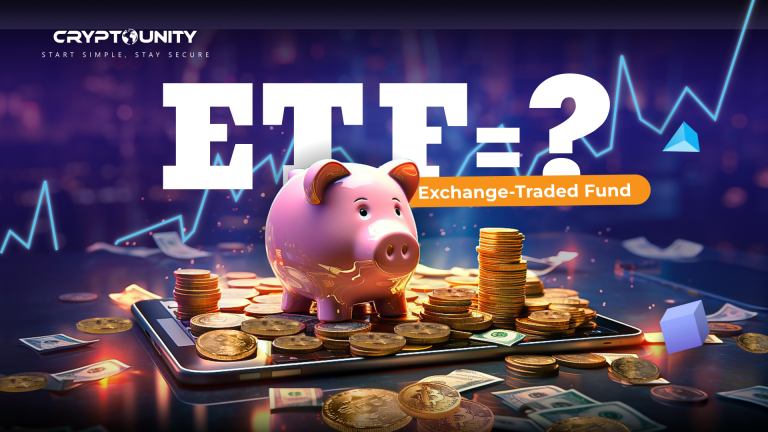What is an ETF?
Think of an Exchange-Traded Fund (ETF) as a shopping basket. But instead of groceries, this basket can hold different types of investments. Some ETFs have a mix of things like company stocks or government loans, while others might just have one type, like only technology company stocks. It’s important to understand that regardless of what’s in your ETF basket, it always counts as a single asset. This means you trade the entire basket as one unit. For instance, if your ETF contains assets A, B, and C, you can’t trade just asset A separately; the entire group of A, B, and C moves together in the market.
You can also find ETFs that follow a set list of investments, like a major stock market list. What’s great about ETFs is that they are flexible: they can have a bit of everything or just one thing. They are easy to buy and sell on the stock market, making them a good choice for people who are new to investing or those who have been investing for a long time.
What is a Bitcoin ETF?
Now, let’s talk about one of the newer and more talked-about types of ETFs: those related to cryptocurrencies, especially Bitcoin. You might have heard a lot about Bitcoin ETFs recently. A Bitcoin ETF is a kind of Exchange-Traded Fund that focuses on the price of Bitcoin, the most known cryptocurrency. It acts as a link between the traditional stock market and the exciting world of crypto. When you buy a Bitcoin ETF, you’re not buying Bitcoin directly. Instead, you’re investing in a fund that tracks Bitcoin’s price. This means you get to participate in Bitcoin’s price movement without dealing with the technical side of cryptocurrencies, like using special exchanges or securing a digital wallet. It’s a more straightforward way for regular investors to explore Bitcoin, especially for those who are intrigued by digital currencies but prefer to stay within the familiar territory of the stock market.
One other significant aspect of Bitcoin ETFs is their appeal to large financial institutions like banks and investment firms, which control huge sums of money. Previously, these institutions often couldn’t invest in Bitcoin due to its complexity, costliness, or regulatory hurdles. With the introduction of Bitcoin ETFs, however, they now have a way to indirectly invest in Bitcoin. This shift of substantial capital from traditional investments, such as real estate, into Bitcoin ETFs could have a significant impact on the cryptocurrency market. The entry of these large players not only moves a lot of money into the market but also increases the overall attention and interest in Bitcoin investing. This heightened interest can create a sense of urgency among regular investors, fueling the excitement and demand for Bitcoin ETFs, which might influence Bitcoin’s availability and market price.
What Do ETFs Bring to the Table?
ETFs offer a practical and flexible way to invest in various assets. They are simple to trade and often incur lower costs than purchasing the assets directly. However, it’s crucial to understand that investing in an ETF, like a Bitcoin ETF, doesn’t mean you own the actual underlying asset. In the case of Bitcoin ETFs, you’re not owning Bitcoin itself, but rather a product that follows Bitcoin’s price. This distinction is important for investors to consider, as it affects the investment’s nature and risks. While ETFs provide an accessible route into different markets, they come with their own set of considerations and shouldn’t be viewed as direct substitutes for owning the actual assets.
The introduction of Bitcoin ETFs has generated a lot of excitement. It’s a sign of the growing integration of cryptocurrencies into the mainstream financial world and has the potential to make investing in Bitcoin more accessible to a wider audience. While it’s true that ETFs, including Bitcoin ETFs, have their own risks and uncertainties, they also represent an important step forward in the evolution of the financial landscape. They bring a sense of optimism about the future of cryptocurrency, suggesting a broader acceptance and understanding of these innovative assets.
Ultimately, while ETFs provide a new and accessible route into the market, they do so without the pressure of jumping directly into asset ownership. This blend of accessibility, innovation, and market evolution is what makes ETFs, particularly in the realm of cryptocurrencies, an intriguing development to watch.





